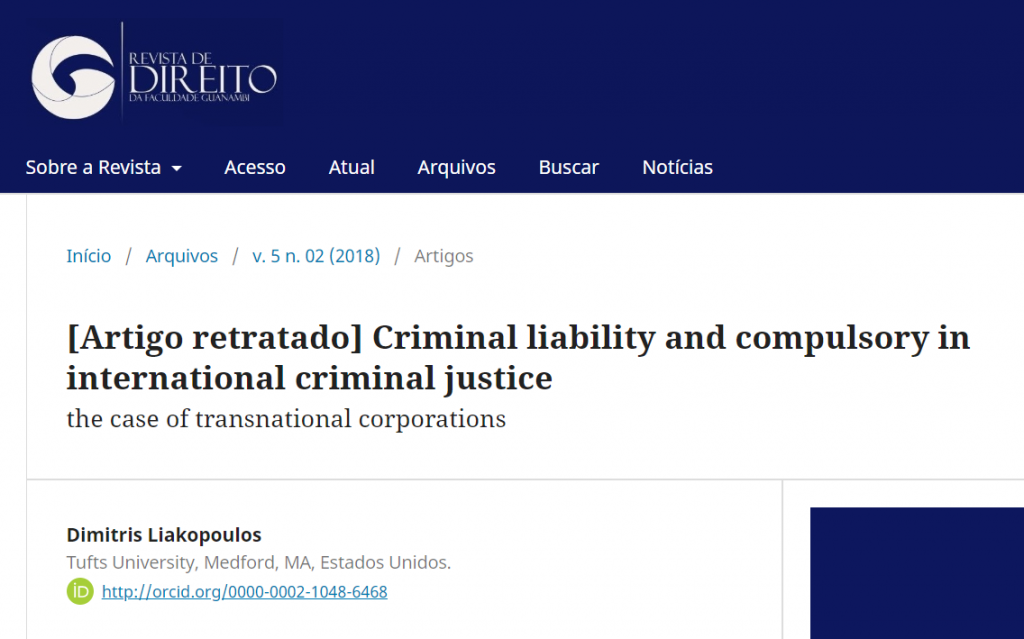
A legal scholar who claims to have held professorships in Italy and the United States and to have written more than 600 papers has had 10 of those articles retracted, some for plagiarism and the most recent also because of a faked affiliation.
Dimitris Liakopoulos, according to his self-written ORCID profile, has
studied at undergraduate and postgraduate level: Law, Political Sciences, Applied Sociology, Religious studies, International Relations, History, Latin Paleography, Art History and Performing Arts at Universities in Rome, Bern, Washington, Frankfurt, Basel and Geneva.
I’ve been teaching: International public and private law, European Union law, Diplomatic and consular law, Air and Space law, International criminal and procedural law, International economic law, environment law, ecc.
Liakopoulos claims in his profile to have held faculty positions at the University of Rome-La Sapienza, Viterbo-La Tuscia, and other universities in Italy, and also at Columbia Law School, Stetson University, the Fletcher School at Tufts University, and at the De Haagse Hogenschool-The Hague.
But now Liakopoulos, who has not responded to requests for comment, has had 10 papers he published between 2019 and 2020 retracted from journals including the International Criminal Law Review, Amsterdam Law Forum, The Chinese Journal of Global Governance, and Revista de Direito da Faculdade Guanambi.
Six of the articles were simply removed, without any retraction notice, but of the other four, all mention plagiarism, and two cite concerns about Liakopoulos’ claimed affiliations.
Liakopoulos lists the Fletcher School at Tufts as his affiliation on the eight papers which are still available online, but his name does not appear in the school’s directory. We asked Gerard Sheehan, vice dean at the Fletcher School of Law at Tufts, for comment, but have yet to hear back. [See update at end of post.]
Liakopoulos is credited with some 50 chapters in Smit & Herzog on The Law of the European Union, a textbook.
He is also listed as the editor of a journal called Juris Gradibus whose scientific board is made up of names that seem…made up.
Update, 2315 UTC, 7/14/20: Sheehan forwarded us a June 26, 2020 letter saying that:
I write to confirm that Dimitris Liakopoulos is not and has never been affiliated with The Fletcher School of Law and Diplomacy, Tufts University.
Like Retraction Watch? You can make a tax-deductible contribution to support our work, follow us on Twitter, like us on Facebook, add us to your RSS reader, or subscribe to our daily digest. If you find a retraction that’s not in our database, you can let us know here. For comments or feedback, email us at [email protected].
Interestingly, the “articles” listed in Juris Gradibus are really only 2 mostly empty pages and 1 abstract each, the latter apparently never properly copy-edited.
Also each “abstract” begins “This work is concentrated on…” and has an author with a name similar to the clearly bogus scientific board. Made up to try to give legitimacy to a predatory journal?
I think interested readers need to pay for individual articles which will then be sent by email. Then there’s this:
“Authors who will sell over 300 pieces, are entitled to copyright, 15% of sales. At the end of each year, each author will receive detailed information of sales of his/her work.”
Whole thing looks fake, but
ORCid profiles are all self-written, or at least approved and submitted by the individuals.
prof. I. Liakopoulou also is the Editor of this journal Art PATHS https://artpaths.jimdofree.com and a lot of his publications appear in this journal as well as the one above Juris Gradibus. This is also seems to have a fake editorial board, and the article format is identical with abstracts written in exactly the same style. Also saying Abstract: The present (sic) work is concentrated on the……. A PDF example abstract from Art PATHS from year 2013 actually has meta data from 2018.
ORCiD profile: “My impact factor is 75 (October 2019 (calculation only 300 publications).”
Google: h = 3
https://scholar.google.com/citations?user=SOhyrCAAAAAJ&hl=en
Amuzing.
Wegb of Science yields h=1 for him (after tedious exclusion of two seemingly similar named scientists, one a mathematician, one a biochemist or medical researcher).
Also interesting: He seemingly is nearly always sole author. Is this a common pattern for law publications? I am asking because I don’t know. How to find an example set of (real) law researchers?
Yes, legal scholarship is predominantly produced by individuals. Occasionally there will be two authors, rarely three, and I do not recall ever seeing four or more on a single article. The exception to this general rule is health law, which has a much greater tendency to emulate the “lab” model.
By far the most comprehensive database of law journals (at least in English) is HeinOnline. Otherwise, they are generally scattered among publisher-run databases. JSTOR also carries some. The specialist databases of case law used by lawyers and legal academics alike also house journal content, but within universities, access to these databases is normally restricted to law faculty and students as far as I am aware.